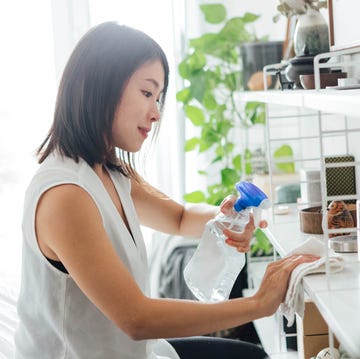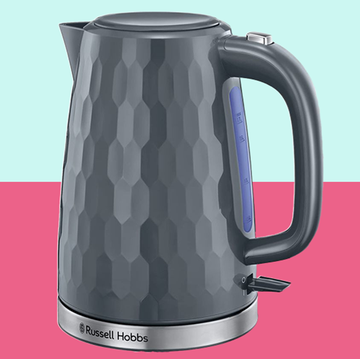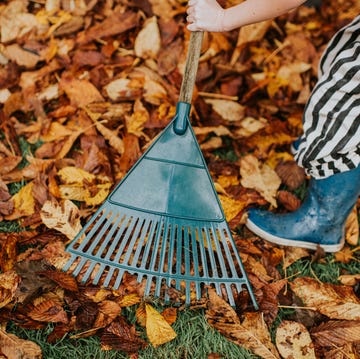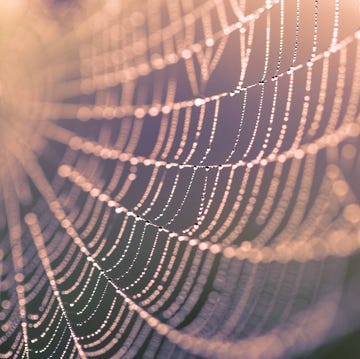Like many people, I’ve always reached for the same trusty antibacterial spray when it’s time to give the house a good wipe-down. It’s reliable, it gets the job done, and I’ve never had reason to doubt it. So, why change?
Well, also like many others, I’ve been hunting for small, easy eco swaps to make at home. Whether it’s cutting down on single-use plastics or using more natural products, I want to feel like I’m doing something to tread a little lighter on the planet.
During my first week as Good Housekeeping’s new household advice writer, I was given The GHI Approved Purdy & Figg All-Natural Multisurface Counter Cleaner to try – perfect timing for my new clean green initiative. Plus my four housemates were more than happy to let me clean the flat. I’ll admit, I was also more than a little sceptical.
What to read next
Could something this pretty and plant-based really cut through the messiness of everyday grime? Spoiler: I was pleasantly surprised.
What is an all-natural cleaner?
The key difference between natural cleaners and traditional chemical ones lies in the ingredients. Natural products typically rely on time-tested staples such as baking soda, white vinegar, lemon juice and essential oils – ingredients that are mild yet effective, with antibacterial and deodorising properties.
On the flipside, many conventional cleaners contain synthetic chemicals, such as phosphates, ammonia and chlorine bleach. While undeniably tough on bacteria, these ingredients can also be harsh on surfaces, your health and the environment. This is exactly why the ‘green cleaning’ movement has gained so much traction in recent years.
My verdict on making the swap to all-natural
Everything from the chic glass bottle to the sustainably sourced essential oils feels thoughtful, eco-friendly and kind to both the home and the planet. It’s plastic-free, paraben-free and not tested on animals – tick, tick, tick.
The set-up was a delight from the start: a sleek ‘bottle for life’, a fluffy microfibre cloth and three concentrated scents arrived in the starter kit. To mix your cleaning solution, simply dilute one of the vials with water in the bottle, and you’re off.
Pro tip: pour slowly, or you’ll spill that precious (and pricey) concentrate
I don’t think I’ve ever used a glass cleaning bottle before, and it was even fancy enough to display on the kitchen counter. It’s a level of aesthetic satisfaction I never got from my regular old supermarket chemical cleaner. However, while the glass may be chic, it's also fragile. So I did have to pop a message in the housemate WhatsApp chat to ensure it was handled with the utmost of care.
The scent is what struck me first. A fresh, subtly floral fragrance that’s more spa day than cleaning day. It’s light, uplifting and feels luxurious without being overpowering. It lingers in the best way and acts like a little pat on the back for being a functioning adult every time you enter the kitchen.
In fact, once my housemates caught the scent, they couldn’t get enough. I think they liked it so much, it might have actually encouraged them to clean more – huge win!
Performance-wise, it held its own. My worktops were grease-free, my backsplash tiles looked brand new – who knew they weren’t meant to be matte? – and it handled dust and smudges like a pro, especially when paired with the included microfibre cloth.
I was really impressed by the lack of residue. In particular, when cleaning up the hob after a sticky stir-fry splash, all it took was one simple wipe and there was no trace of the sauce. Despite the stubborn stickiness, I didn’t even have to let the spray sit for a bit before it removed the spill with relative ease. The hob and the counter were immediately clean and dry to the touch. No tacky streaks or chemical film, just a shiny surface smiling back at me.
However, it’s not a miracle worker. When trying to tackle bathroom tasks, like shampoo and soap scum in shower corners or stubborn watermarks, I needed some extra elbow grease to get the job done. And I’d hesitate to rely on it after prepping raw meat in the kitchen, as it’s not technically antibacterial in the way chemical disinfectants are – an important distinction, and the one that’s previously held me back from taking the all-natural plunge with my cleaning products.
Naturally, this pretty little bottle comes at a steeper premium than your average surface spray, and affordability is always something to consider when it comes to household essentials. Plus, after one week of frequent cleaning, I’ve already used almost a third of the bottle. The starter pack itself costs £15, but after that newbie deal, the prices go up to more than £30. But do keep in mind these sets are the equivalent of three bottles worth (300ml each).
All that said, it looks great, smells great and cleans well. When you take into account the thought that goes into the ingredients, I don’t think that’s too bad a price point.
Would I make the switch completely? For day-to-day sprucing, absolutely. For deep cleans or high-risk zones, I’ll keep a backup antibacterial spray in the cupboard. But as something that makes cleaning feel like less of a chore, this is definitely going in my regular rotation.
The pros of all-natural surface cleaners
Because they use milder, naturally occurring ingredients, natural cleaners tend to be much gentler on surfaces, so they can be safer to use all around the house on glass, wood and stone – unlike chemical cleaners, which can degrade surfaces and have to specify which ones they can be used on.
Natural cleaning products tend to be effective for a long time, too. This is because of their ability to break down dirt and bacteria at a molecular level – yes, we’re getting science-y with it. They often use enzymes to do this, and their biodegradability allows them to continue working without leaving harmful residues. While chemical cleaners can also use enzymes to this same effect, they often leave behind sticky chemical residues that attract new dirt or simply linger past their welcome.
The drawbacks of using all-natural surface cleaners
Chemical-based products are incredibly tough on grime, but natural alternatives often require a bit more elbow grease to get the job done. It doesn’t mean they’re not up to the task, but they could require an extra spray or added pressure when tackling stubborn or grimy jobs. Generally speaking, natural cleaners and other green cleaning products are often better suited to everyday jobs rather than deep, sanitising cleans. So the likelihood is you may still want to keep a chemical-based product in the cupboard for the occasional hefty job.






















